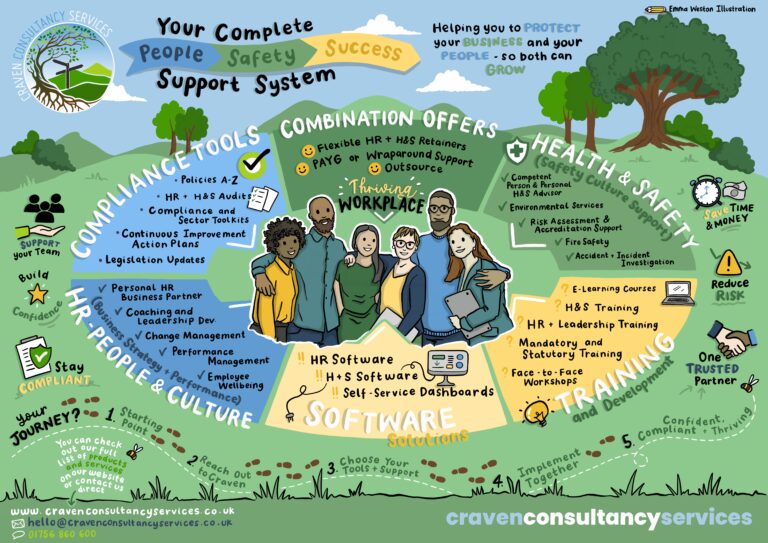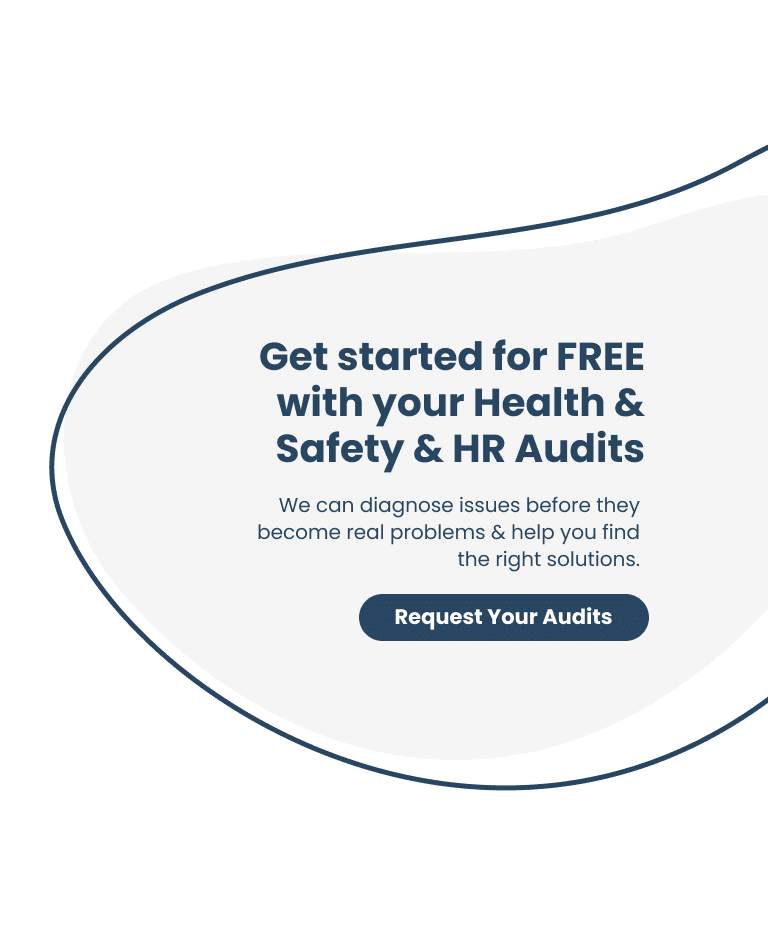The following HR policies are required by UK law to ensure compliance with employment regulations:
1. Disciplinary and Dismissal Policy
- Ensures fair and consistent handling of disciplinary actions and terminations.
- Legal Basis: Employment Rights Act 1996 requires businesses to inform employees of disciplinary rules and procedures in writing.
2. Grievance Policy
- Outlines how employees can raise concerns or complaints about workplace issues.
- Legal Basis: Employers must have procedures for dealing with grievances under the ACAS Code of Practice.
3. Health and Safety Policy
- Details how the company will protect employees’ health, safety, and welfare.
- Legal Basis: Required under the Health and Safety at Work Act 1974 for businesses with five or more employees.
Implementing a robust set of HR policies ensures compliance with legal requirements, promotes fairness, and enhances workplace efficiency. Many of these policies are included in a company’s staff handbook for ease of access, while some larger or more detailed policies, such as safeguarding or environmental policies, may be maintained as standalone documents.
2. Recommended HR Policies (Best Practice)
Recommended Policies for Small Businesses
While not all policies are legally required, adopting comprehensive HR policies demonstrates a commitment to good practices and benefits both employees and the organisation. Below is a detailed list of recommended policies and the reasons they are valuable.
1. Equal Opportunities Policy
- Purpose: Promotes fairness and prevents discrimination based on characteristics such as gender, race, religion, age, or disability.
- Why It’s Important: Aligns with the Equality Act 2010, fostering an inclusive workplace that values diversity. It also helps protect the business from discrimination claims.
2. Health & Safety Policy
- Purpose: Ensures the safety and well-being of employees, customers, and visitors in the workplace.
- Why It’s Important: Legally required for businesses with more than five employees, it reduces accidents, enhances workplace safety, and demonstrates a commitment to employee welfare.
3. Lateness and Time Off Policy
- Purpose: Sets clear expectations for attendance, including procedures for managing lateness, sickness, and other absences.
- Why It’s Important: Encourages accountability, reduces unplanned disruptions, and provides a fair framework for handling time-off requests.
4. Disciplinary and Grievance Policy
- Purpose: Establishes procedures for managing disciplinary issues and resolving employee grievances.
- Why It’s Important: Ensures fair treatment, reduces the risk of disputes escalating, and helps the business comply with the Acas Code of Practice.
5. Data Protection and Privacy Policy
- Purpose: Outlines how personal data is collected, processed, stored, and shared, ensuring compliance with GDPR.
- Why It’s Important: Protects the organisation from data breaches and builds trust by safeguarding employee and customer information.
6. Remote Working Policy
- Purpose: Provides guidance on expectations, communication, and IT security for employees working remotely or in hybrid arrangements.
- Why It’s Important: Supports flexibility, enhances productivity, and ensures business continuity in remote work settings.
7. Social Media Policy
- Purpose: Regulates the use of social media during work hours and provides guidelines for representing the company online.
- Why It’s Important: Protects the business’s reputation and minimizes risks of inappropriate or damaging content.
8. Anti-Bribery and Corruption Policy
- Purpose: Prevents bribery, corruption, and unethical practices, in line with the Bribery Act 2010.
- Why It’s Important: Upholds ethical business practices and reduces legal risks associated with corruption.
9. Dress Code Policy
- Purpose: Defines appropriate workplace attire based on safety requirements, branding, or industry standards.
- Why It’s Important: Maintains professionalism while allowing flexibility for cultural, religious, or personal preferences.
10. Whistleblowing Policy
- Purpose: Encourages employees to report unethical behaviour or illegal activities without fear of retaliation.
- Why It’s Important: Promotes transparency, accountability, and a safe environment for raising concerns.
11. Workplace Bullying and Harassment Policy
- Purpose: Clearly defines unacceptable behaviours and provides a framework for addressing complaints.
- Why It’s Important: Creates a respectful and inclusive workplace, reducing the risk of legal claims and improving employee morale.
12. Training and Development Policy
- Purpose: Highlights the company’s approach to employee training, upskilling, and career progression.
- Why It’s Important: Enhances employee engagement, boosts productivity, and supports retention by investing in staff development.
13. Environmental Policy
- Purpose: Sets goals and initiatives for sustainability, such as recycling, reducing energy use, and minimising waste.
- Why It’s Important: Demonstrates corporate responsibility, appeals to environmentally conscious customers and staff, and may fulfil regulatory requirements in certain industries.
14. Flexible Working Policy
- Purpose: Outlines procedures for requesting flexible working arrangements, in line with the Flexible Working Regulations 2014.
- Why It’s Important: Supports work-life balance, increases employee satisfaction, and enhances recruitment efforts.
Creating Effective HR Policies
When developing HR policies, ensure they are:
- Clear and Specific: Avoid ambiguity and define expectations and procedures in detail.
- Flexible: Allow room for adaptation to changing business needs.
- Communicated: Ensure all employees understand the policies and their implications.
- Legally Compliant: Align policies with current UK employment laws and regulations.
How to Introduce and Review HR Policies
Effectively introducing and reviewing HR policies involves several key steps to ensure they are practical, relevant, and enforceable:
- Evaluate Current Practices
- Start by assessing your existing formal and informal workplace practices. Identify areas that need improvement or alignment with legal standards.
- Research and Benchmarking
- Compare your practices to those of similar organizations in your industry or region. This helps identify best practices and ensures your policies are competitive and compliant.
- Consult Employees and Stakeholders
- Engage staff representatives or unions to gather valuable insights and feedback. Their input can help shape policies that are fair and widely accepted.
- Form Development Groups
- Create steering committees or working groups to collaboratively draft policies and establish realistic timelines for their rollout.
- Test the Policies
- Conduct pilot tests of draft policies to evaluate their practicality and impact. Use the results to refine and improve the policies before full implementation.
- Guide Managers
- Provide managers with clear instructions and training on how to implement and enforce the policies consistently across the organisation.
- Integrate Policies into Onboarding
- Introduce the policies during the induction process for new employees to ensure they understand expectations and guidelines from the start.
- Regular Policy Reviews
- Establish an ongoing review process to ensure policies remain relevant, effective, and aligned with any legal or organisational changes.
Goal:
Strive to create policies that are complementary to your workplace culture, adaptable to changing needs, practical for day-to-day operations, and enforceable to maintain fairness and compliance.
These policies will help small businesses manage their workforce effectively while staying compliant and fostering a supportive and productive environment. Let me know if you need templates or further guidance for any of these policies!
Need more help?
Contact one of the HR Team for expert advice and guidance.








